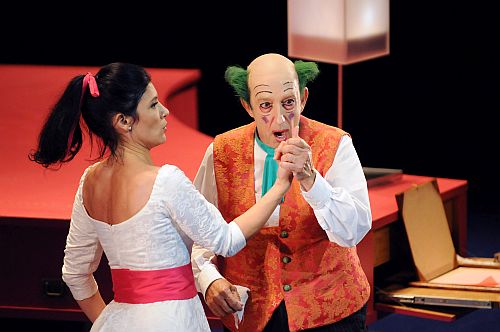 Spain Rossini: Il Barbiere di Siviglia, Liceu Orchestra and Chorus, Giuseppe Finzi (conductor), Gran Teatre del Liceu, Barcelona, 16 & 22.9.2014 (JMI)
Spain Rossini: Il Barbiere di Siviglia, Liceu Orchestra and Chorus, Giuseppe Finzi (conductor), Gran Teatre del Liceu, Barcelona, 16 & 22.9.2014 (JMI)

Casts:
Figaro: Mario Cassi/Lionel Lhote
Rosina: Annalisa Stroppa/Ketevan Kemoklidze
Almaviva: Juan Francisco Gatell/Bogdan Mihai
Don Bartolo: Carlos Chausson/José Fardilha
Don Basilio: John Relyea/Dmitry Ulyanov
Berta: Marisa Martins
Fiorello/Officer: Manel Esteve
Production: Liceu in co-production with Houston Grand Opera, Opera National de Bordeaux, Opera Australia and Canadian Opera Company
Direction: Joan Font
Sets and Costumes: Joan Guillén
Lighting: Albert Faura
Barcelona’s Liceu opened the season with an opera that is always popular at the box office. However, performances of it rarely end in an unquestionable triumph as that requires the combination of an adequate stage production, a light and sparkling musical direction and a cast that is well-suited to Rossini’s demands. None of these ingredients were fully present at Liceu.
The staging by Joan Font had its premiere three years ago inHouston.I must say that the first problem here had to do with the production itself. No fewer than 11 extras are introduced on stage, and they’re constantly moving about while the singers perform Rossini’s beautiful music.This continuous movement is merely distracting, unless you close your eyes and try to focus on the music.
Joan Font emphasizes the comic aspect of the opera with colorful and exaggerated buffo characters (Don Bartolo, Don Basilio, Don Alonso and even Figaro). The sets are simple, and the action makes an easy transition from outdoors to the inside of Don Bartolo’s house. There’s a big piano in the middle of the stage, where the singers and extras are often found. Eliminating the extras and focusing more on the stage direction would have produced better results.
The musical direction was in the hands of Giuseppe Finzi, new to this house, and his conducting was effective although short of lightness and life on more than one occasion. The Liceu Orchestra under his baton continues to be a problem. Time passes and things do not improve: Josep Pons has been the director for the past two years, and the results are just not there.
Mario Cassi was Figaro in the first cast, and apparently his only desire was to show the size of his voice in a recital of open sounds. He doesn’t seem to know what elegance and refinement can mean in singing. The second Figaro, baritone Lionel Lhote, gave a correct but somewhat impersonal performance. He was not bad but rather monotonous. He’s one of those singers you forget when leaving the theater.
Annalisa Stroppa was a fine Rosina. She has an attractive voice, comfortable in coloratura, and she’s easy on stage. The least convincing part lies in the weakness of her lower notes. Ketewan Kemoklidze showed remarkable stage skills. As for her voice, there is a noticeable difference between registers and a rather artificial sound below.
Juan Francisco Gatell was a good Almaviva. He is a light tenor and easy in agilities, but his rather tight top notes are a problem. Bogdan Mihai showed a nice voice, very good in coloratura, but his center is too small, and he escapes the high notes whenever they arise. Both had difficulties with “Cessa di piu resistere.”
The best performance in either cast was by Carlos Chausson as Don Bartolo. He offered an authentic example of how to play and sing a buffo role: a lesson from a great artist. José Fardilha was no more than correct in the second cast.
John Relyea was a proper Don Basilio, while Dmitry Ulyanov showed what a colpo di cannone means in “La Calunnia.” His style was a different matter.
José Mª Irurzun